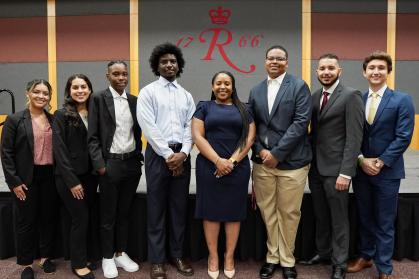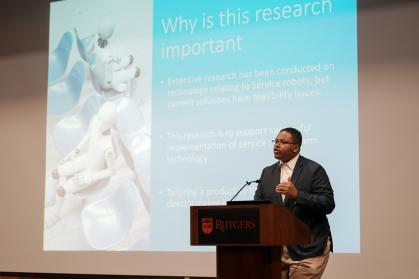Become a McNair Scholar
Apply to Become a McNair Scholar
Cultivate your interests, conduct research with a faculty mentor, and attend pre-graduate school planning workshops.
Priority Deadline to apply is December 31st
Application Requirements
1. Candidates for the McNair Scholars Program must meet the following criteria as determined by the U.S. Department of Education:
- U.S. Citizen or Permanent Resident
- Minimum cumulative GPA of 3.0 at the time of application
- Intend to pursue a doctorate upon completion of bachelor degree [excluding master’s degree, professional degree, MD (doctor of medicine), and JD (juris doctor) seekers]
- Completed at least 54 credits prior to summer institute
- Low income as defined by the U.S. Department of Education and a first-generation college student (neither residential parent completed a 4-year degree)
Review Income Guidelines HERE
*The term "low-income individual" means an individual whose family's taxable income for the preceding year did not exceed 150 percent of the poverty level amount.
2. Letter of Recommendation (PDF): Applicants must complete the waiver at the top of the form. Then, the recommender may complete the remainder of the form and email the scanned document to mcnair@echo.rutgers.edu.
3. Complete the online application to become a McNair scholar
Program Benefits
The McNair Scholars Program offers services, events, and programs for undergraduate students interested in attending graduate school. These services hope to cultivate interest, engage exploration, and encourage pursuit of graduate school for students from diverse backgrounds. McNair Scholars have many opportunities to experience and/or present at professional research conferences. The following are a list of some resources for McNair Scholars. Feel free to contact the program staff to discuss any of these opportunities.

Social and Cultural Experiences
- Build a network with faculty, senior administrators, peers, and alumni
- Visit graduate school programs, including meeting with graduate staff, faculty, and students
- Invitation to special lectures, academic luncheons, research conferences, and professional development programs
- Engagement in cultural enrichment activities such as the theater, museums, and interactive team-building activities
Courses and Workshops
- Basics of Research (Spring Semester, New Admits)
- Graduate Preparation I (Fall Semester, Juniors/Continuing)
- Graduate Preparation II (Fall Semester, Seniors/Graduating)
- Public Speaking and Presentation Skills (i.e. academic presentations to non-academic audiences)
- Workshops on such topics as Résumé/Curriculum Vitae, Institutional Review Board (IRB), Time Management, Financial Literacy and Debt Management Planning, Maintaining Faculty Mentor Relationships, Graduate Record Exam (GRE) Preparation, and more
Mentorship and Tutoring
- Available supplemental academic tutoring and student success coaching for current undergraduate courses
- Empower and support McNair Scholars in their research and academic endeavors
- Involvement in opportunities that may help strengthen their competitiveness for graduate school
- Assist as McNair Scholars navigate the graduate school culture in classrooms and labs
- Support McNair Scholars in research and graduate school processes from experienced mentors
Academic Guidance
- Pre-graduate school advising, including academic, personal, and career
- Strategic goal-setting for life after college and planning towards a successful graduate education
- Graduate school planning, including program selection, composing application materials and funding opportunities, reviewing offer letters, and negotiating financial packages
Academic Research, Writing, and Presentations
- Conduct research with a faculty member in any academic discipline or field
- Find a faculty mentor
- Deliver presentations to both academic and non-academic audiences
- Learn how to:
- effectively utilize library tools and databases in academic field or discipline;
- communicate the value of research to broad and specific audiences;
- produce quality writing and presentations in academic discipline or field (include oral and poster);
Professional Development
- Conferences and Summer Research Opportunities
- Graduate Application Fee Waivers
- Guidance with Graduate Student Funding Opportunities
